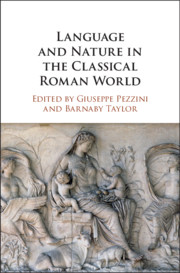Book contents
- Language and Nature in the Classical Roman World
- Language and Nature in the Classical Roman World
- Copyright page
- Contents
- Contributors
- Acknowledgements
- Abbreviations
- Introduction: First Thoughts on Language and Nature
- Chapter 1 Posidonius’ Linguistic Naturalism and Its Philosophical Pedigree
- Chapter 2 Lucilius on Latin Spelling, Grammar, and Usage
- Chapter 3 Nigidius Figulus’ Naturalism
- Chapter 4 Naturalism in Morphology
- Chapter 5 What’s Hecuba to Him?
- Chapter 6 Linguistic Naturalism in Cicero’s Academica
- Chapter 7 Linguistic Naturalism and Natural Style
- Chapter 8 Natural Law and Natural Language in the First Century BCE
- Bibliography
- Index Locorum
- Index Nominum et Rerum
Chapter 6 - Linguistic Naturalism in Cicero’s Academica
Published online by Cambridge University Press: 05 June 2019
- Language and Nature in the Classical Roman World
- Language and Nature in the Classical Roman World
- Copyright page
- Contents
- Contributors
- Acknowledgements
- Abbreviations
- Introduction: First Thoughts on Language and Nature
- Chapter 1 Posidonius’ Linguistic Naturalism and Its Philosophical Pedigree
- Chapter 2 Lucilius on Latin Spelling, Grammar, and Usage
- Chapter 3 Nigidius Figulus’ Naturalism
- Chapter 4 Naturalism in Morphology
- Chapter 5 What’s Hecuba to Him?
- Chapter 6 Linguistic Naturalism in Cicero’s Academica
- Chapter 7 Linguistic Naturalism and Natural Style
- Chapter 8 Natural Law and Natural Language in the First Century BCE
- Bibliography
- Index Locorum
- Index Nominum et Rerum
Summary
The Academica is a dialogue completed in 45 BC, near the beginning of the second of the two phases in his life when Cicero produced – broadly speaking – philosophical dialogues. The work is devoted to epistemology, and specifically the question of whether there is empirical knowledge as the Stoics defined it, an issue which had been debated by Stoics and Academics since the third century BC. There are speakers for the Stoic side, in particular Stoic epistemology as adopted by Antiochus of Ascalon (previously an Academic sceptic, who then turned to dogmatism), and speakers who represent Academic scepticism. Each side advances arguments for its position, as well as offering a historical account of the Academic tradition as they construe it (only one of them is extant in full). Cicero published the work in two editions, changing the speakers and shifting the fictional date of the dialogue from 62 or 61 BC to a time near the date of composition. Of these, the second book of the first edition in two books and part of the first book of the second edition in four books are extant. While some modification of the material beyond the necessary changes of speakers and scenery is likely, there is little reason to suspect substantial differences in subject matter between the two editions.1
- Type
- Chapter
- Information
- Language and Nature in the Classical Roman World , pp. 153 - 170Publisher: Cambridge University PressPrint publication year: 2019
- 2
- Cited by

